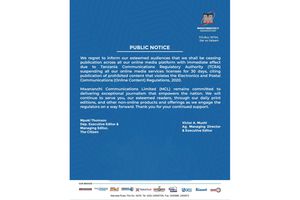Tanzania economy grows 7.4pc in 2014 first quarter

GROWTH: Tanzania is among 11 African countries that record a high growth of real gross domestic product. It is second in East Africa. The projected growth for the current year is 7.2 per cent while for the two next years it is to be 7.4 per cent .
What you need to know:
- In monetary terms, the GDP was Sh4.9 trillion during the first quarter of this year – up from Sh4.5 trillion at a similar period in 2013
Dar es Salaam. Tanzania’s economy grew by 7.4 per cent in the first quarter of this year, driven mainly by communication, transport, industry, construction, energy and water sectors, the National Bureau of Statistics (NBS) said yesterday.
During a similar period last year, the gross domestic product (GDP) grew by 7.1 per cent.
In monetary terms, the GDP was Sh4.9 trillion during the first quarter of this year – up from Sh4.5 trillion at a similar period in 2013.
With the current quarterly GDP growth, NBS is optimistic that Tanzania will attain its projected annual growth of 7.2 per cent in 2014.
“Basically, the performance in various economic activities is impressive,” the NBS director of economic statistics, Morrice Oyuke said in Dar es Salaam yesterday.
Extraction of minerals, stones and graves for construction purposes went up by 8.7 per cent in the first quarter of this year – up from 1.7 per cent recorded during a similar period last year.
The increase was mainly boosted by increasing production of gold in the period between January and March this year.
Manufacturing activities grew by 8.5 per cent in the first quarter of this year compared with an 8.3 per cent growth during the first quarter of 2013. This, according to Mr Oyuke, was mainly driven by an increase in food, beverages and tobacco manufacturing.




